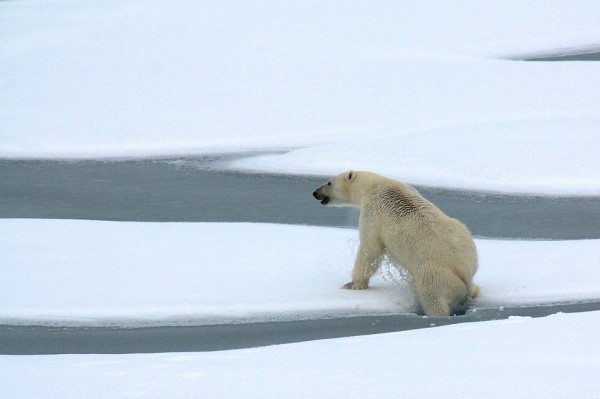By Ana Verayo, | September 22, 2016

The Arctic sea ice cover has hit its record second lowest level since 2012.
Numerous studies have observed and measured how the Arctic region is losing its sea ice cover as it heats up twice as fast as any other region on Earth.
During September every year, the Arctic region typically reaches its minimum sea ice cover. However, in recent years, the Arctic ice cover has hit record lows. After the ice cover reached its lowest record minimum in 2012, this year appears to be the second lowest sea ice cover on record. But scientists have debunked a theory that the Atlantic ocean is heating up the Arctic region.
Like Us on Facebook
Scientists have been examining the factors that may be causing the Arctic's sea ice levels to fall. These factors include extreme warming across the Arctic that is influenced by atmospheric and ocean events as the heat gets incorporated in Arctic winds due to warmer Atlantic waters.
Subsurface waters in the Arctic can also heat up due t the Atlantic ocean's water temperatures. This heat is enough to melt the entire Arctic sea ice cover in two years. However, this warm water entering the Arctic is offset by a new layer of fresh ice from winter and the underlying sea ice.
Past studies have suggested that even if sea ice declines, winds can stir up ocean temperatures and transfer heat to the surface. But a new study by Yale University along with the Canadian Department of Fisheries and Oceans, the Woods Hole Oceanographic Institution, and the National Oceanography Center, contradicts this theory.
According to Tom Rippeth, a professor of Ocean Physics at Bangor University, new measurements from recent research during record low sea ice levels along with the strongest Arctic storm during the summer of 2012 proves that this is not the case. Despite ice-free and stormy conditions, there is no evidence that heat was stirred up from inflowing Atlantic waters.
The team's findings reveal a new model demonstrating how that the heat from the Atlantic Ocean will be restricted to the ocean's perimeters.
This new study has been published in the journal, Geophysical Research Letters.
-
Use of Coronavirus Pandemic Drones Raises Privacy Concerns: Drones Spread Fear, Local Officials Say

-
Coronavirus Hampers The Delivery Of Lockheed Martin F-35 Stealth Fighters For 2020

-
Instagram Speeds Up Plans to Add Account Memorialization Feature Due to COVID-19 Deaths

-
NASA: Perseverance Plans to Bring 'Mars Rock' to Earth in 2031

-
600 Dead And 3,000 In The Hospital as Iranians Believed Drinking High-Concentrations of Alcohol Can Cure The Coronavirus

-
600 Dead And 3,000 In The Hospital as Iranians Believed Drinking High-Concentrations of Alcohol Can Cure The Coronavirus

-
COVID-19: Doctors, Nurses Use Virtual Reality to Learn New Skills in Treating Coronavirus Patients







